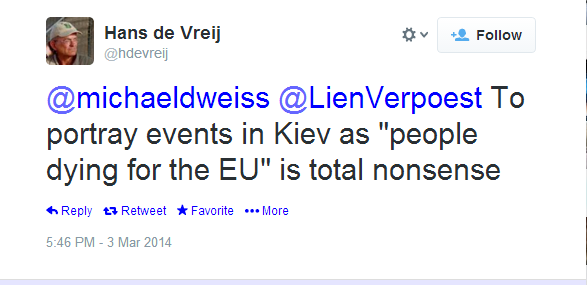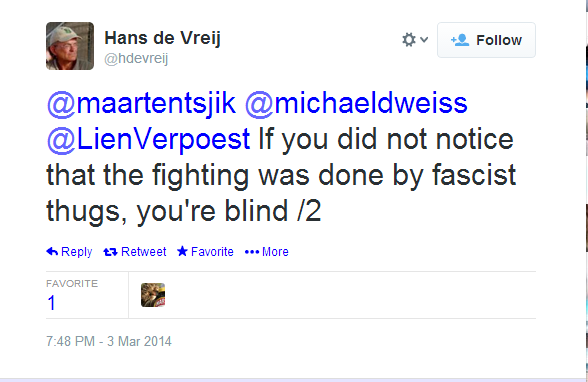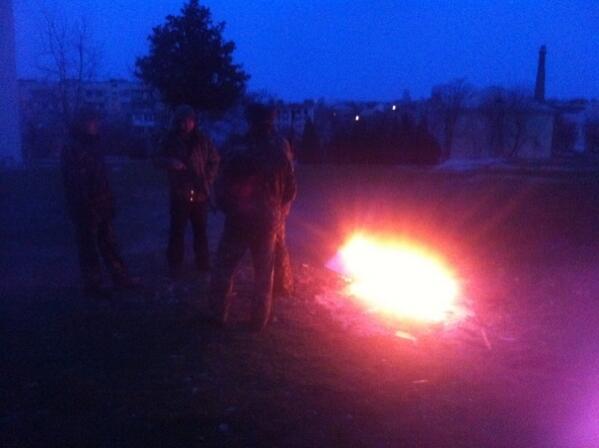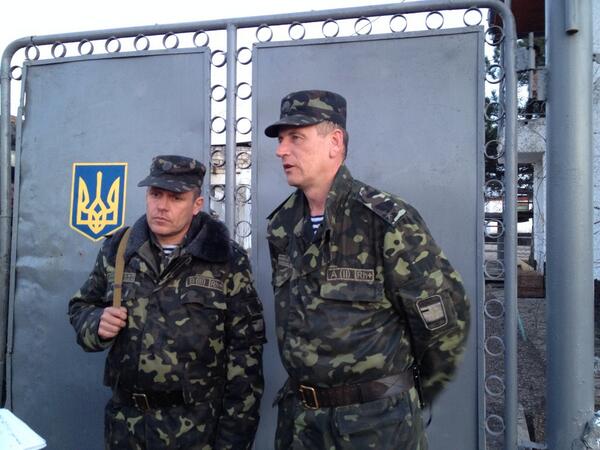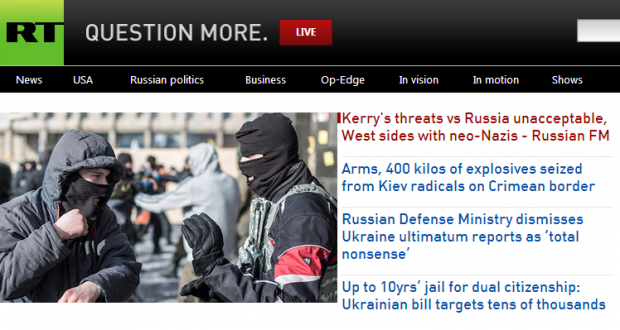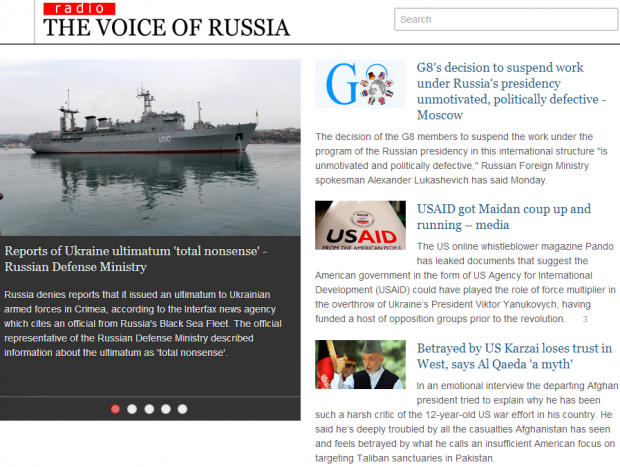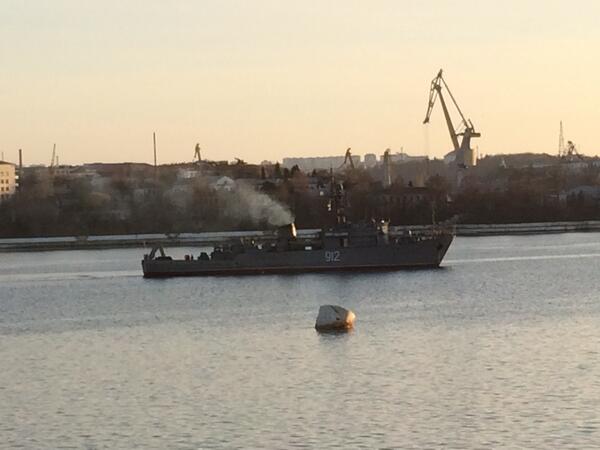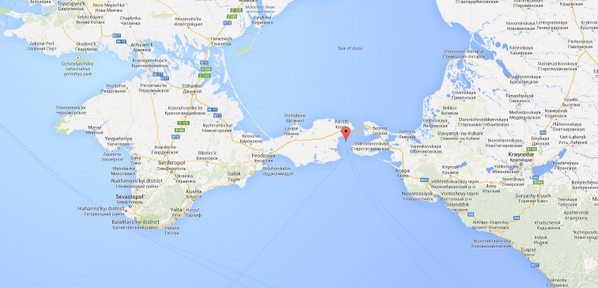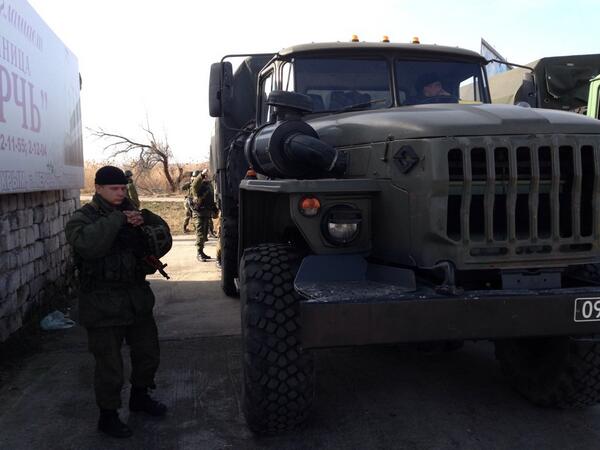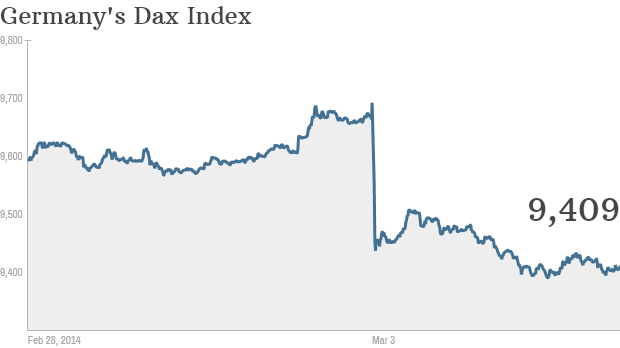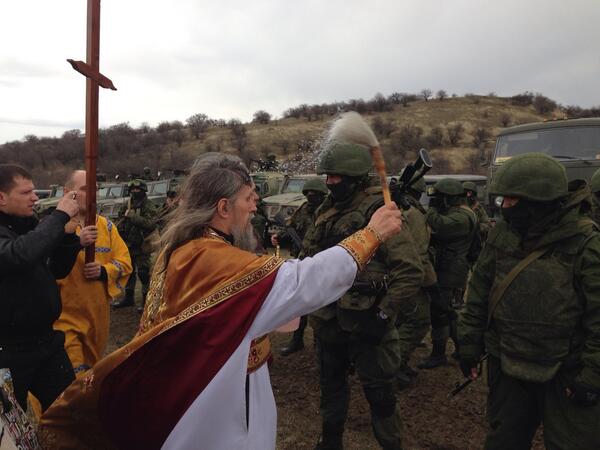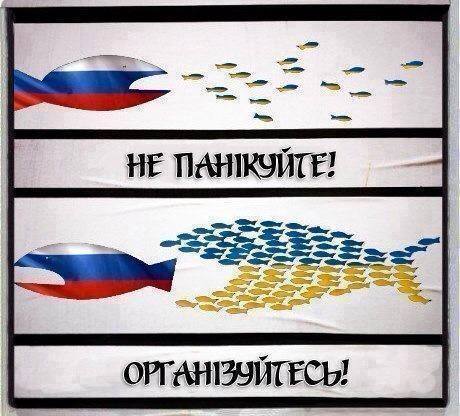Russia has vowed that its troops will stay until the situation in Ukraine is “normalized,” Russian troops are demanding that the Ukrainian bases they have surrounded surrender before the day is out, and two people beaten by pro-Russian crowds in Kharkiv have died. Is today the day when this standoff between Ukraine’s new government and the Russian army, essentially a cold war, turns hot?
Yesterday’s liveblog can be found here. For an overview and analysis of this developing story see see our latest podcast.
Below, we will be making regular updates throughout the day:
0952 GMT: At this hour, CNN is reporting that “700 Ukrainian soldiers and officers defected today.” But we cannot find any Russian state media source claiming this (ITAR-TASS, Interfax Ukraine, Izvestiya.ua, Gazeta.ru and others have not reported it, although it would likely be front-page news). We’re waiting for clarification from CNN. Earlier UNIAN and Radio Svoboda said there were no defections other than the Naval commander. Izvestiya reported the same story as Radio Svoboda that there were no defections other than the commander.
700 Ukrainian soldiers and officers defected today, Russia's state news agency said. http://t.co/lmc6FwUBHs
— CNN Breaking News (@cnnbrk) March 4, 2014
@catfitz @cnnbrk Not even RT America
— Rich Thompson (@RichThompsonAK) March 4, 2014
0858 GMT: Many have been looking to the Russian Presidential Human Rights Council to see whether people who have served as the conscience of Russia would muster a majority to oppose the Russian invasion of Ukraine. But just 28 out of the 65 members of the Presidential Council for the Development of Civil Society and Human Rights (as it is formally known) signed the statement in opposition to the Federation Council’s consent for President Vladimir Putin to send troops to Ukraine, noting that it was based on false reports of attacks on ethnic Russians that had not taken place. An additional 6 members later made public statements disassociating themselves from their colleagues’ protest.
LifeNews, a TV station said to be close to the Kremlin, has made much of the division among the Russian civil society leaders, and has run quotes of Alexander Brod, head of the Moscow Bureau of Human Rights, claiming that the draft statement appeared first in English before being issued in Russian. LiveNews also quoted Yelena Nikolayeva, who claimed to have seen the statement published in France 20 February before it was signed 3 March. Nikolayeva also said she had girlfriend in Odessa, where her grandmother is buried, and learned from her that there had been attacks on Jews there. But there has been no confirmation of any “foreign agents'” provenance of the appeal against the invasion, nor any attacks on Jews reported throughout the last 14 days of unrest in Ukraine. As we reported last week, a synagogue in Simferopol was defaced and another in Zaporozhe suffered a hit with Molotov cocktails.
Two Council members, one who supported the original appeal against the invasion, Andrei Yurov and one who issued a dissenting statement, Maksim Shevchenko, have gone to the Crimea where they are monitoring the situation at a Ukrainian army base blocked by Russian solders.
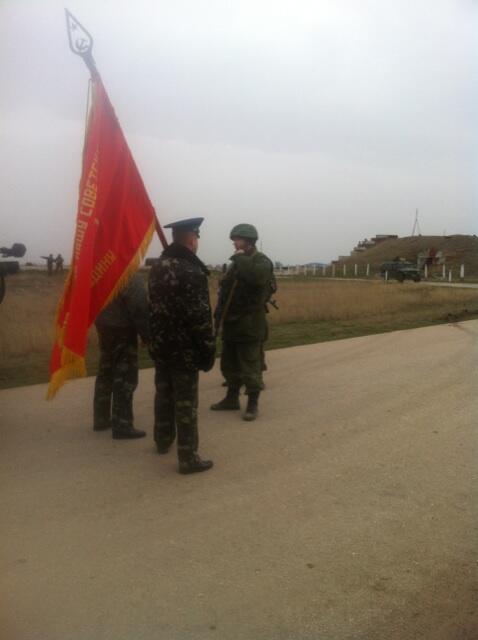
Face off between Ukraine base commander Col. Yuli Manchur and Russian officer at occupied Belbek airbase. Photo by Simon Shuster of Time
Not a single military unit, barracks, or ship fulfilled the ultimatum from the Russian military to give up their arms and swear to the self-proclaimed “government of Crimea” to leave service, UNIAN and Radio Svoboda reported, citing representatives of the Ukrainian Navy in Sevastopol. Ukrainian military officials also reported that they had no cases of desertion, except for the “fact of treason” of the former Ukrainian Naval commander Denis Berezovsky.
Vladislav Seleznyov, head of the Defense Ministry media center in the Crimea confirmed that throughout the night of 4 March there were no stormings and no attacks on military bases recorded, although the situation was tense.
0819 GMT: Watch Simon Shuster of Time magazine live-tweeting the tense stand-off between the Ukrainian Navy and the Russian Black Sea Fleet commanders this morning.
Ukraine commander demands to guard the base jointly with Russians, who pledge to give their commanders' response by 12:00, in 2 hours
— Simon Shuster (@shustry) March 4, 2014
Personnel carrier just arrived, disgorging armed Russian troops at checkpoint. Ukraine commander just finished negotiating.
— Simon Shuster (@shustry) March 4, 2014
Ukraine Colonel still negotiating, Russian snipers & RPGs still aiming at column of soldiers. But deescalation is clear, at least in Belbek
— Simon Shuster (@shustry) March 4, 2014
0444 GMT: We close the day (with the opening of the new day) the same way we started it — with Russia’s stock market in near free-fall (jump to update 1554 for this morning’s report):
Russian stocks collapse by 10% this morning. Investors pricing in the fact that Putin may have lost his mind. http://t.co/4ey8DAWJ8O
— Simon Shuster (@shustry) March 3, 2014
0432 GMT: A former spokesman for Amnesty International, Hans de Vreij, has dismissed the Euromaidan protesters as inherently radical:
Vreij went on to post several pictures of some of the more heavily-armed protesters, and seems to make the argument that the “vigilantes” are more interested in conquering Ukraine than joining the EU:
@maartentsjik @michaeldweiss @LienVerpoest And groups like Pravy Sektor, SNA, UNA-UNSO, Patriot Ukraini are ANTI-EU, not PRO
— Hans de Vreij (@hdevreij) March 4, 2014
A Pentagon spokesman, Navy Rear Adm. John Kirby, said Monday evening that the U.S. military has “put on hold” all military-to-military engagements, including bilateral meetings, port visits and planning conferences.
Kirby said the Pentagon values the relationship it has developed with the Russian military in the last few years, to reduce the risk of military miscalculation.
0408 GMT: Again, Simon Shuster reports. These troops don’t exactly look like they’re on high alert. This is probably as close to an “all clear” as we’ll see tonight:
Sunrise inside the garrison of Ukraine's Belbek base. The supposed Russian ultimatum passed an hour ago. #crimea pic.twitter.com/BVkWe05RvR
— Simon Shuster (@shustry) March 4, 2014
0355 GMT: Most people reading this at the moment are probably trying to see whether the Russian troops are commencing attacks on Ukraine’s bases. And so far, the news is that there is no news (or very little at least). A few minutes ago some APCs were spotted moving towards Sevastopol, but all else is quiet:
No signs of Russian forces at the Ukrainian pilots HQ in #Sevastopol #Ukraine #Crimea
— Pierre Crom (@PierreCrom) March 4, 2014
Arriving outside Perevalnoye army base we had to talk our way out of a very aggressive, drunk pro-Russian group of men 'guarding' the road.
— Tom Barton (@TomBartonJourno) March 4, 2014
Locals tell me the base commander near Simferopol made a deal with the Russians surrounding them to keep the peace.
— Tom Barton (@TomBartonJourno) March 4, 2014
One epically drunk 'self defence' thug with a baseball bat demanded to see our documents 3 times while wobbling into us outside army base.
— Tom Barton (@TomBartonJourno) March 4, 2014
Russian troops at Perevalnoye Ukrainian army base weren't even surrounding it at 0300 GMT. All seemed to be inside their trucks.
— Tom Barton (@TomBartonJourno) March 4, 2014
But all is not quiet everywhere in Crimea. Again, Time’s Simon Shuster reports:
Some kind of missile batteries mounted on 4 more Russian APCs outside Belbek base. That's very new.
— Simon Shuster (@shustry) March 4, 2014
0341 GMT: The Russian ambassador to the UN, Vitali Churkin, said earlier that millions of Ukrainians are pro-Hitler, and are essentially willing to strike back at the Russians for what happened in World War II. It is one of the many distortion emanating from the Kremlin and its owned-and-operated media outlets. What happened in Kiev is inherently a movement of Neo-Nazis and radicals, according to the Russian logic. Furthermore, the Kremlin, and Russia’s ambassador, keep repeating the lie that an Orthodox Monastery in Kiev has been under attack by Euromaidan protesters, when in fact the Monastery itself reports that the opposite is true. Another distortion, that antisemitism is on the rise or is a major part of the movement in Kiev, has been shot down by several Ukrainian Jewish leaders and the leader of the Ukrainian Right Sector (who was meeting with the Israeli ambassador at the time).
And so, a responsible journalist cannot allow the statements of the ambassador, or those who echo him, to go unchecked. And yet CNN’s Wolf Blitzer was willing to do just that, to say that, according to ambassador Churkin, these things were true. Christiane Amanpour, however, took offense to these things being left hanging and unchecked, especially at the end of a statement.
It’s not journalism if you allow patently false statements to be aired unchecked. It’s stenography. And stenography is actually warned against in the Pew Research Center’s Core Principles of journalism. There’s a lot of it going around, though, especially in echoing the statements from the Kremlin.
0324 GMT: Earlier today Russian naval commanders and envoys reportedly threatened Ukrainian bases and naval ships in Crimea, telling them that they had until 0300 GMT to surrender. That time has now passed. And while Russian troops are not likely to announce when they are attacking, only when they are willing to, all eyes are understandably on Sevastopol where the first hammer stroke may fall.
As such, this report from a journalist from Time should be taken seriously, though who knows what it means.
Just spotted 3 APCs with Russian flags moving north from Sevastopol toward Simferopol. That's new.
— Simon Shuster (@shustry) March 4, 2014
.@michaeldweiss Slavutych is nearly unarmed, but the only serious vessel of UA navy. C3I and missile ranging. Rest is almost brown-water.
— E.S.W. (@Iteration23) March 3, 2014
0157 GMT:ATR.ua, Crimean Tatar TV in Simferopol reported at 20:30 local time tonight that Aleksandr Vitko, Commander of the Russian Federation Black Sea Fleet, has given an ultimatum to the Ukrainian Navy to surrender their forces by 05:00 am 4 March.
ATR.ua reached Eldar Sadykov, chief petty officer of the Slavutych, where 120 men are on board, by telephone. He said Ukrainian Navy Counter-Admiral Gaydyuk had given the command not to surrender. Said Sadykov,
“The Russian Federation commander of the Black Sea Fleet gave us the command to turn in our weapons and give up the ship. But we will not do that. We took an oath to defend the Ukrainian people and we will not surrender.”
2313 GMT:Crimea’s Top Ten List. Andrew Wilson of the European Council on Foreign Relations and a scholar at University College London’s School of Slavonic & East European Studies has a handy list of facts pertaining to the crisis in Crimea. This has been widely circulated on Facebook:
1. The new pro-Russian Crimean authorities, who took power on 27 February, were established at gunpoint. Despite Russian rhetoric about a ‘coup’ in Kiev, the real coup was in Crimea. The Crimean Assembly building was taken over by Berkut militia and ‘irregulars’ after a seemingly successful rally supporting the authorities in Kiev. Many of these were allegedly fleeing from their crimes against demonstrators in Kiev.
2. This is totally unlike the Russian war in Georgia in 2008. Then, by most accounts, the Georgians were provoked into firing first. This time, the situation in Crimea was perfectly stable before the Russian take-over. The Russian language is protected in the ‘Autonomous Republic of Crimea’ under the Ukrainian Constitution. Only one Russian citizen has died in the current crisis, and he was shot by snipers in Kiev.
3. The proposed referendum on 30 March to ‘decide Crimea’s future status’ is against the Ukrainian Constitution. Only a national vote can change the country’s borders.
4. The new Crimean ‘Prime Minister’ Sergey Aksionov was a local gangster in the 1990s. His nickname was ‘goblin’. His Russia Party won only 4% at the last elections in Crimea
5. There are 266,000 Crimean Tatars in Crimea. Before the coup they were chanting ‘Allah is Great! Glory to Ukraine!’. Now they are reportedly forming ‘self-defence’ units. They were all deported by Stalin to Central Asia in 1944; half died as a result. They were only allowed to return after 1989 and still live in marginal conditions. The 70th anniversary of the Deportation is this May.
6. The Crimean Tatars are Sunni Muslim. The Crimean Tatar Khanate was the dominant power in the region from 1441 until Crimea was occupied by the Russian Empire in 1783. The campaign to turn it into a Russian Athos, a centre of Orthodox Christianity, only gathered pace after the Crimean War.
7. There is an ethnic Russian majority in Crimea (58%), but most are post-war in-migrants. Some 24% are Ukrainian. Crimean Tatars are over 13%, but nearer 20% of the school population.
8. Crimea is a peninsula. It gets all its water and gas from the rest of Ukraine.
9. There are big deposits of oil and gas off the Crimean coast.
10. Russia is re-supplying its Black Sea Fleet for a role in the Eastern Mediterranean, including linking up with the old Soviet naval base in Tartu, Syria.
2218 GMT: Churkin now says that millions of Ukrainians support Hitler, and would return to Hitler’s ways, and this is the reason why Russia needs to intervene, like Reagan did in Grenada, to protect ethnic Russians.
#Churkin: It’s not our task to return #Yanukovych to power. We know he won’t come back to his mansion although we acknowledge him as pres
— Myroslava Petsa (@myroslavapetsa) March 3, 2014
Now Samantha Power responds. Yanukovych did not sign the agreements passed by the Rada, left the city, left the country, and then was voted out of office with his own party turning against him.
She also asks why Russia would not allow international monitors and peacekeepers.
2205 GMT: Now the Russian ambassador has the floor again.
He starts by welcoming his Ukrainian colleague, and congratulates him on speaking in English, French, and Russian. Then he says that a “normal” constitutional process needs to happen. Russia is defending democracy.
Russia says that the laws under Yanukovych were not anti-democratic, and he challenges the idea that there is now a democracy in Kiev. He reiterates that radicals are part of the people in charge in Kiev, and dictators often take power during revolutions. He says Yanukovych fled because he was afraid for his life. He says that the situation in Crimea could have been a repeat of what happened in Kiev. Now he spins a story about armed gunmen who were in Crimea to remove the government of Crimea (it’s a confused and somewhat rambling argument, but essentially he’s saying that armed gunmen were a threat to the people in Crimea, so the Russian troops that were already there, in response to a request from the Crimean government, intervened).
Churkin then says that Samantha Power must be getting all of her information from American TV, and on American TV everything in Ukraine is wonderful.
2150 GMT: Now Ukraine’s representative is speaking again. He says Russia has not provided any evidence as to why Russia invaded Crimea. He reiterates that Ukraine gave up their nuclear weapons in a deal with Russia, and that deal has been violated by Russia. He says that more than 16,000 Russian troops occupy Crimea, all main roads are blocked, and all government agencies in Crimea have been seized by the Russian soldiers. Their presence is evidence that Russia may militarily intervene in the mainland of Ukraine.
The representative of Ukraine also says that Russia is making more provocative acts, have made threats against Ukrainian soldiers, is using paramilitary and unknown persons to incite violence as justification of their occupation of Ukraine, and is spreading propaganda.
So far the Ukrainian military has not responded, but they are ready to do so if needed.
Ukraine reiterates that it does not need any outside military support, and so Russia can leave.
Now he is speaking about the February 21st agreement. He reiterates that the fact that Yanukovych fled the capital made it impossible for him to govern (the logic then goes that the Rada had the right to impeach him in his absence, and so their new government is legal).
2145 GMT: Now that the superpowers are done speaking at the UNSC, and a series of smaller and more remote countries are talking, let’s take a look at other issues.
In the UK, there is not much appetite for sanctions — or at least sanctions that might also hurt UK’s financial interests. The Guardian has a bit of a scoop. Steve Back, a freelance photographer, took a picture of a document in the hands of an unnamed government official at a national security council meeting. The document says that the UK cannot pass sanctions that specifically hurt London’s economy:
• “Not support, for now, trade sanctions … or close London’s financial centre to Russians.”
• “Discourage any discussions (eg at Nato) of contingency military preparations”.
• Embark on “contingency EU work on providing Ukraine with alternative gas [supplies] if Russia cuts them off”.
• Draw up a technical assistance package for Ukraine “ideally jointly with Germany”.
• Pursue the “deployment of OSCE and/or UN (but not EU) monitors in Crimea and eastern Ukraine”.
• Push the “UN secretary general Ban to take the lead in calling and creating a forum for engaging Russia on Ukraine”.
• Accept an emergency summit of EU leaders to discuss Ukraine.
2130 GMT: Australia’s ambassador is now speaking. His statements sound similar to the other European countries. The only soundbite is that there is no other option to resolve this crisis than through peace.
The representative from Chile is now speaking. ”
2125 GMT: Now China’s ambassador is speaking. “We condemn the recent extreme violent acts in Ukraine.” But what are those?
The Chinese ambassador says they respect Ukraine’s sovereign and territorial integrity, but then says “there are reasons” for the ways things have happened. The statement is very vague, with language echoing statements from both Russia and the other UNSC members.
2119 GMT: Rwanda is now giving comments.
“Given the complexity and fragility on the ground” they request a unified effort from international communities to study the crisis and ensure a peaceful solution to the crisis.
“Though Rwanda is geographically removed from Ukraine” the representative says that the reckless actions of nuclear powers are a world threat.
Now Jordan ambassador is speaking. They have called for all states concerned to respect international treaties with Ukraine (in other words, Russia needs to withdraw to bases agreed upon in 1994 and 1997).
2115 GMT: Lithuania has made similar statements to those by UK, France, and the US. Lithuania’s ambassador specifically uses the word “separatism” to describe Russia’s provocations.
2107 GMT: Now the UK ambassador speaks. He is echoing Russian media’s claims and the claims of the Russian government, and reiterating that there is no evidence for these claims. “It is clear that the Russian government has fabricated these claims to justify military action.”
The UK ambassador again says that Russia is in violation with countless international laws and agreements. He says that Yanukovych is illegitimate, so his desire to go back to Ukraine as its leader is unacceptable. The Ukrainian government is legitimate.
The UK’s ambassador has asked the Ukrainian government to act calmly to avoid further pretext for expansion of Russian military action. The ambassador has asked Russia to withdraw its forces to force levels previously agreed to by Russia and Ukraine. Russia needs to directly dialogue with Kiev, and needs to consult with Ukrainian leaders as specified by the treaty of 1994.
There also needs to be a fact-finding and observer mission in Ukraine.
The UK’s ambassador then asks the UN Deputy Secretary General to go to Crimea.
2102 GMT: France’s ambassador notes that when Russia invaded Czechoslovakia, the same justifications were used. Once again, however, Russia has invaded another country based on propaganda and justification.
The Russian army is occupiers. In the age of the internet it is easy to prove that Russia’s claims are untrue.
France’s ambassador says that the flight of the president and the about-face of the parliament made the February 21st agreement impossible. A national coalition government has been called for by the acting government of Ukraine, and so this is the road forward.
France demands that Russia pulls back. France also demands that the opposition restore the bill about the protection of languages (the repeal of which, again, has been vetoed), and the rights of minorities needs to be protected.
But he reiterates that Russia has violated international law. But he’s not optimistic. “Russia seems to be going back to its old ghosts, playing an outdated role in an outdated setting.” There will be consequences if Russia does not comply, though the ambassador does not specify what those would be.
2100 GMT: Power goes on to say that Russia’s negotiations with sub-national groups, namely the government of Crimea, is a breach of international law.
Power calls for international observers in Ukraine, the pullback of Russian forces, the deployment of human rights monitors, and a dialogue after this is all done.
Power then says that Russia may not like that Yanukovych fled, that the new government has taken over in Kiev, or that Yanukovych’s own party has, in many cases, joined the new coalition. Then she says that by fleeing Kiev and Ukraine, it is Yanukovych that broke the agreement of February 21st. The February 21st agreement, then is turning back the clock, and is an empty notion.
Power says that this is an act of aggression.
2055 GMT: US Ambassador Samantha Power fires back — “you’d think Russia is the enforcing arm for the UN Commission for Human Rights.” She goes on to say that there is no factual basis for Russia’s statements, but the facts (she says fact at the start of every sentence) is that Russia has taken over Crimea, in breach of the Helsinki accord, international law, and Russia’s various deals with Ukraine.
“Russia’s mobilization is a response to an imaginary threat.” There is no evidence that churches have been attacked, that ethnic Russians have been attacked or are in danger, or that the Russian language will be banned.
2050 GMT: The Russian ambassador says that the goal of the Russian presence in Crimea is to defend the most important human right — the right to life, especially when it comes to ethnic Russians. The ambassador says that Ukraine is on the brink of civil war. “People are being persecuted for ideas and language.” He says there are violent acts against civilians.
Again, this is a great exaggeration.
Russia’s ambassador then makes an indignant statement about how Russia’s actions are being viewed as aggression.
Russia wants to establish a government of national unity, but it would seem that this would require, first, the reestablishment of the negotiated agreement between ousted President Yanukovych and the opposition leaders.
Russia reiterates that it is not a crisis of their making, but a crisis sparked by the ultra-nationalist gangs.
2045 GMT: Now Russia’s ambassador is speaking. He reiterates that this crisis was sparked by the armed takeover by extremists of the government of Kiev. Any solution must use a dialogue of all ethnic and national groups within Ukraine to come up to a peaceful solution.
Russia says its partners (the other members of the UNSC) have worked with the extremists to create this terror. “Armed national radicals, under slogans of anti-Russian and anti-semitic banners” have taken over the country.
The only way to fix this crisis is to abide by the agreement of February 21st (which would put Yanukovych back in power).
The Russian ambassador is also referencing a bill that would strip the Russian language as a secondary language in Ukraine. However, the bill has been vetoed, and the bill would not have forced people to speak Russian even if it was not, so this is exaggerated.
2039 GMT: The UN Security Council has started. Russia called the meeting.
The representative of Ukraine has been added to the meeting.
The Assistant Secretary General — Department of Political Affairs, gives a briefing. So far, the point is that local militias have taken over government buildings in Crimea, and Russia is in violation, according to Ukraine, of the treaty that allows the Black Sea fleet to be in Ukraine.
The Deputy Secretary General, Jan Eliasson , is in Ukraine to report back to the UNSC. The Secretary General has also reached out to all relevant leaders and has called for dialogue to find a peaceful resolution to the crisis.
2035 GMT: Pro-Russian crowds have taken over government buildings in both Odessa and Donetsk. The New York Times provides this video:
2015 GMT: This video clip has been circulating in social media all today, but just now has been moved to “private” on YouTube and is no longer visible, althought it is still shown on some news sites. It shows a woman who says she is from Odessa and has come to the Sevastopol State Region Administration to tell her story.
The video has been disseminated as “proof that Russians are attacked” in Ukraine, and we also spotted it linked on the Right Sector VKontakte page with the nasty comment, “Goebbels wail,” i.e. implying that it is concocted Kremlin propaganda, apparently because the women appear to have told their story in several settings. We don’t know the woman’s name or whether her tears are real, but even if they are proven to be fake, there are others with real enough tears in the Russian population very afraid about what they see as new rulers in Kiev who will harm them.
But after carefully listening to the video in full, we’ve discovered that, in reality, the video may just be another battleground for the narrative in Ukraine.
See our separate analysis, Youtube is the Continuation of War by Other Means
2010 GMT: We’re not sure what’s going to happen tonight at 3 AM GMT (10 PM EST) when a reported (and disputed) ultimatum reaches its deadline, but Mike Gilgio, who is in Crimea, makes a strong point:
re: talk of a Russian ultimatum in Crimea, not sure why they’d need to fight and kill people here when they already control the place
— Mike Giglio (@mike_giglio) March 3, 2014
2005 GMT: Meanwhile, this military intervention in Crimea is not popular with many Russians. More and more are making their displeasure with the military intervention known. The International Memorial Society released this statement today (via HRO.org):
The decision to send Russian troops to Ukraine is a crime. A crime not only against Ukraine, but also against Russia, against Russian culture and Russian history, against their inseparable link with the history and culture of Ukraine. It is a crime against both our countries.
The pretext for sending troops is given as a ‘threat to the lives of our compatriots’.
We know from experience of the past that this is the usual pretext for aggression. This pretext is false.
On the contrary, sending troops will create a threat for our compatriots: they will be perceived as representing an aggressor.
It is not too late to reconsider.
Then there was this statement by musician Andrei Makarevich, also translated by HRO.org (which we have excerpted below:
I’m very concerned about what is happening in Ukraine. But I’m much more concerned about what’s happening on that account in my own country.
I cannot rid myself of the feeling that our authorities perceive the country and its people as nothing more than things for them to control.
However, if a ruler does not listen to its people, and at the same time uses force against it, the people will overthrow him. What happened in Ukraine is typical of a revolution, and for all my lack of love of revolutions, I cannot say that this was unjust.
And now, no matter how much they go on about the protestors being a ‘brown plague,’ it looks abominable…
Of course, a lot of stupid things have happened in Ukraine -with the Russian language, with the removal of memorials. But stupidities like that are inevitable when there is a revolution – the spring pushes back in the opposite direction. And then everything returns to its rightful place. Stupidities don’t go on for ever.
Guys, we have to live with them. We’ll be neighbours just as in the past. And it’s best if we are friends. And how they will live – that’s for them to decide themselves.
Or you just wanted to do some shooting?
They patriotism makes you stronger.
But not for long.
1953 GMT: Anderson Cooper is in Kiev, and he says that people there are more unified than ever in the face of this Russian threat. According to Cooper, people have gone to the recruiting offices in order to join the military in large numbers. Last night, The Interpreter’s managing editor James Miller spoke to the BBC for an hour, and sources of theirs in Kiev reported the same thing.
At least in Western Ukraine, people are lining up behind this new government. Of course, it’s a very different story in the east.
1935 GMT: First, the reports of an assault on a Ukrainian naval base that we said were “very unconfirmed” appear to be false:
No assault on Sevastopol navy HQ, contrary to tweets. Pro-Russia rally out front, wooden crates stacked high behind civilians blocking gate.
— Alexander Marquardt (@MarquardtA) March 3, 2014
Second, Ukrainian commanders in Crimea do reiterate once again that they have been asked to surrender to Russian forces, but refuse to do so:
The #Ukraine commander told us the Russians told him to surrender his weapons to the Russian Federation-he said no.. pic.twitter.com/dc1larctqz
— Stuart Webb (@Worldwidewebb1) March 3, 2014
The Russians also told the #Ukraine commander to pledge loyalty 2 the pro Russia Crimea government-he said no he was loyal to Ukraine govt
— Stuart Webb (@Worldwidewebb1) March 3, 2014
Our sources now suggest that nearly the entire Ukrainian army and navy on the Crimean peninsula is surrounded — and by a far more imposing fighting force:
Amazing scene of ukraine navy vessel surrounded by Russian flagged tugs & blocked by Russian warships In Sevastopol pic.twitter.com/pH4DhRHW3M
— William Booth (@BoothWilliam) March 3, 2014
1927 GMT: Europe may not be ready to pass sanctions, but it appears that the Obama administration is:
State Dept: “It is likely that we will put (sanctions against #Russia) in place, and we are preparing that right now. #Ukraine
— Alexander Marquardt (@MarquardtA) March 3, 2014
1921 GMT: Two important geo-political developments. The first comes from the head of NATO:
Tomorrow, the #NATO Council will hold a meeting under Article 4 of the Treaty following a request by #Poland http://t.co/2cpRSRBklo #Ukraine
— AndersFogh Rasmussen (@AndersFoghR) March 3, 2014
Also, the UN Security Council will meet this afternoon, at the request of Russia. But UK’s ambassador to the UN has an interesting twist:
#Ukraine : #UNSC will meet at 1530 NY time to discuss latest developments. We support Ukraine PR being allowed to speak at this meeting.
— Mark Lyall Grant (@LyallGrant) March 3, 2014
1905 GMT: Sky News reporter Katie Stallard has been stopped by a group of Berkut and anti-Euromaidan militants operating a roadblock between Kiev and Crimea. The militia then showed her a group of weapons that they say were captured from Euromaidan protesters, “barbarians and Nazis,” who were also headed to Crimea:
They took us to see a stockpile of weapons they claim they have seized from cars on the way into Crimea.
They showed us shotguns, hunting rifles, axes, and ammunition, along with a photo they say shows a sniper in army fatigues.
Evidence, they insist of armed gangs from Kiev.
The guns in the picture look old, like old hunting equipment perhaps. This certainly isn’t military-grade equipment. RT.com, however, is running the same report. Though RT appears to be relying on Sky News as their source, at least to some extent, their own headlines are far more alarming:
The Cossacks and Berkut troops at the road checkpoint in the Crimean peninsula have confiscated explosives equivalent to 400 kilograms of TNT as well as grenades, rifles and guns, Russia-1 TV channel reports.
The blasting agent was transported in a single batch by a truck, with the local self-defense forces currently investigating the origins and the purpose of the load. They told told RIA-Novosti news agency that the driver and the passenger of the truck were Maidan activists.
“They are citizens of Lvov [in western Ukraine], Maksim Shepetaylo – born in 1990 and Vasily Pusko – born in 1989. They didn’t hide the fact that since December last year that active participated in Maidan clashes [in Kiev],” the source said.
400 pounds of TNT would take up nearly 4 cubic feet. It is interesting that Sky News did not notice a massive pallet of TNT, or any grenades or sniper rifles, when they reported from the roadblock.
1850 GMT: The Russian government is working hard to limit how far news of Ukrainian protests spread inside Russia. The Moscow Times reports:
Russia’s Internet monitoring agency has blocked 13 Internet pages linked to the Ukraine protest movement that helped oust the country’s Russia-leaning president last week.
Roskomnadzor said in a statement published online Monday that it had been ordered by the general prosecutor’s office to shut down the pages on Russia’s leading social media website, Vkontakte. The agency said the groups “propagandized the activity of Ukrainian nationalist groups,” and accused them of encouraging “terrorist activity” and “participation in unsanctioned mass actions.”
Instead, the Russian media is busy trying to build its own narrative. This is the front page of RT right now:
The Voice of Russia:
1841 GMT: Very unconfirmed reports of an assault on a Ukrainian naval base in Crimea:
Reports coming in that Russian assault on UKR Navy HQ in Sebastopol has begun in last hour, eg http://t.co/x8IQH5vBs0 (decent site, btw)
— John Schindler (@20committee) March 3, 2014
Reports coming in that lead assault on UKR Navy HQ being done by titushki with baseball bats, with heavily armed RU troops behind them.
— John Schindler (@20committee) March 3, 2014
1717 GMT: Just to clarify an earlier report, both Moscow and Kiev have said that no ultimatum was given that Ukrainian military forces need to surrender to Russian troops by 3 AM (jump to update 1654). We have asked Kyiv Post’s Christopher Miller (who is doing an amazing job) to clarify whether he had personally heard the Russian naval commander give the ultimatum. Miller confirmed for us that he did hear the ultimatum himself, and then he sent this tweet:
Despite what Russian Defense Ministry says, those of us who were there heard this ship deliver ultimatum to Slavutych pic.twitter.com/fuf0enF19O
— Christopher Miller (@ChristopherJM) March 3, 2014
But we have to keep in mind that the Kremlin, and the media outlets it controls, won’t even admit that Russian troops are operating outside of the Black Sea fleet bases in Crimea, and maintain that Russia’s interests are only to “maintain order.” Take this report from RT:
lso, a source in the Russian Defense Ministry told RT that they are unaware of any Russian ultimatum toward the Ukrainian forces in Crimea.
The source revealed that they had only heard about the alleged ultimatum from a report by Interfax-Ukraine news agency.
“We’re interested in keeping friendly relations with the people of Ukraine and in preserving stability,” the source told RT.
So as an ultimatum was given, did the naval commander do it on his own? Has he been told to back off? Is this more Russian disinformation? Or is this just plausible deniability, and the ultimatum is real?
1714 GMT: AP’s ever-insightful (and often sarcastic) Matt Lee has this assessment:
Another bold move? “@kwelkernbc: NSC Official: “US will no longer send a Presidential Delegation to Winter Paralympic Games in Sochi.””
— Matt Lee (@APDiploWriter) March 3, 2014
1704 GMT: We now know where ousted Ukrainian President Viktor Yanukovych (remember him?) is hiding — he’s in Russia. We also know that the new government says that under the last three years of his rule, more than $70 billion were sent out of the country. The Interpreter’s Andrew Bowen reports:
In his wake he left not only confusion, anger and the bodies of numerous Ukrainians—protestors and police alike—but also numerous documents, documents which, in his haste, he was unable to get rid of (or amateurishly tried to) and detail the almost incomprehensible level of pillaging of the Ukrainian economy and government. The documents, and the incoming government, detail—an initial—report of at least $37 billion vanishing from state coffers (supposedly through fraudulent loans), and a total of $70 billion being sent out of the country to offshore locations during Yanukovych’s three year rule.
While the amounts are surprising, the pilfering is not, especially with the revelations of Caligula levels of extravagance and frivolity. Ukraine has long suffered from corruption, and not just under the most recent government of Yanukovych—the recently released former prime minister Yulia Tymoshenko has been accused of corruption during virtually her entire political career and undoubtedly contain some merit.
The question remains however, where did all the money go?
Bowen also has some of the answers. Read his investigation: How Yanukovych Pillaged Ukraine
1654 GMT: We’ve been following this report of an “ultimatum” given to Crimean base commanders to surrender by 3 AM GMT to Russian forces. Several sources now have heard denials from within the Ukrainian government, and several other sources suggest that Russian naval commanders have indeed issued this ultimatum.
Russian defense ministry calls Crimea ultimatum report “utter nonsense” http://t.co/TR7iCUmasw they won’t say the troops are theirs, though
— max seddon (@maxseddon) March 3, 2014
A Haaretz reporter in Crimea offers this report:
Moscow & Kiev both denying an ultimatum was issued. On the other hand, the #Russia admiral may have been acting on his own accord #Ukraine
— Anshel Pfeffer (@AnshelPfeffer) March 3, 2014
1648 GMT: Another Russian provocation:
Yikes. Russia is conducting live-fire exercises in the Baltic!
— Edward Lucas (@edwardlucas) March 3, 2014
The Russian state-owned news company ITAR-TASS reports:
More than 3,500 servicemen of the Russian Baltic Fleet are taking part in the tactical exercise of coast guard troops on a test-site in the Kaliningrad region on Russia’s Baltic coast in the framework of a surprise inspection of combat readiness of troops and ammunition of the Western and Central Military District.
More than 450 units of military hardware, including personnel armored carriers BMP-2, tanks T-72, self-propelled artillery installations and communication facilities, are taking part in the large-scale exercise, Chief of the public relations department of the press service of the Western Military District Captain 2nd rank Vladimir Matveyev told Itar-Tass on Monday.
1638 GMT: The United States may be threatening sanctions, or even threatening to cut off trade with Russia, but it looks like the EU, which has far more expansive trade connections with Russia, will not follow suit.
Germany, France, Britain, the Netherlands and Finland are among those favouring mediation and efforts to calm the crisis, diplomats indicated. German Chancellor Angela Merkel spoke to Putin by phone on Sunday evening and proposed a “fact-finding” mission to start a political dialogue. A German government spokesman said Putin had accepted the idea.
Finland, which shares a border with Russia, said EU leaders or the OSCE could play a role in “seeking solutions and carrying them out, especially in protecting the rights of minorities”.
Last night, the G7 issues a statement that they would not attend the G8 conference in Sochi in two months. But though there were harsh words, there was no threat to drop Russia from the G8. In other words, the American media may be focused on Obama’s lack of action in Ukraine or elsewhere, but it now seems that the U.S. may be the lone country talking sanctions.
One thing sticks with us — when Russia’s Federation Council authorized the use of force in Ukraine, one member basically said that they had been expecting this moment for some time. Putin has likely already counted the costs he thinks he’ll pay for invading Ukraine or annexing Crimea. He likely planned on financial fallout. Is the EU’s inaction in his calculations already, or will he see this as buying Crimea, or maybe all of Ukraine, for less than he thought he’s have to spend?
1626 GMT: There’s debate about whether an ultimatum has been given to Crimean commanders to surrender, as the Ukrainian defense ministry reported earlier:
Simferopol base in Crimea still in Ukrainian hands. Commander says he has not heard any new Russian ultimatum to give up by Tues 5am.
— Elizabeth Palmer (@elizapalmer) March 3, 2014
Just spoke to UKR defence min source who is on a base now. Neither he nor base commanders heard about 0300GMT ultimatum, say prob nonsense.
— Shaun Walker (@shaunwalker7) March 3, 2014
Though Christopher Miller did report earlier that a Russian ship was also issuing this order (see update 1530). And now the Russian media is reporting it:
Russia issues ultimatum to Ukrainian forces in Crimea to leave by Tuesday morning or face ‘military storm’, according to Russian state media
— Victor Blackwell CNN (@VictorCNN) March 3, 2014
1607 GMT: Two interesting reports from Kerch, on the eastern edge of the Crimean peninsula (map). The first is that the Russian Prime Minister, Dmitry Medvedev, has ordered the construction of a bridge from Russia to Kerch to directly link Crimea with Russia:
Strait of Kerch, where Russia orders to build a bridge, is the only place of direct Crimea link w/ Russia pic.twitter.com/gsmRDS90ZP
— Maxim Eristavi (@MaximEristavi) March 3, 2014
The Moscow Times reports:
In December 2013, Russia and Ukraine signed a series of bilateral agreements, one of which was dedicated to the construction of the bridge, and despite the collapse of working-relations between Moscow and Kiev over the current crisis in Ukraine, Medvedev expects the deals to be honored.
Medvedev said that the creation of a reliable and cheap transport link between Crimea and the Taman Peninsula in the Krasnodar region was in the interests of both countries in terms of developing trade and joint investment projects.
“Ukraine has always been and will remain an important trade and economic partner to us, and the government should work on these issues,” Medvedev said during a meeting with his deputies, according to the government’s website. “We are following the developments closely.”
Meanwhile, Russian troops are already stationed in Kerch — though they say they’re stationed in Russia:
Kerch #Crimea from where reports are coming in that border guards can see a build up of Russian armoured vehicles. pic.twitter.com/YDYRDdmcAF
— Kevin Bishop (@bishopk) March 3, 2014
The soldiers at #Kerch answered some questions.They said they’d come from#Sevastopol base and #Crimea was Russia pic.twitter.com/9YevQtY6Km
— alex rossi (@alexrossiSKY) March 3, 2014
ITV news reports that the Russian troops have taken over a ferry terminal and are busy positioning military hardware in Crimea:
Soldiers are operating the terminal, which serves as a common departure point for many Russian-bound ships. The men refused to identify themselves, but they spoke Russian and the vehicles transporting them had Russian licence plates.
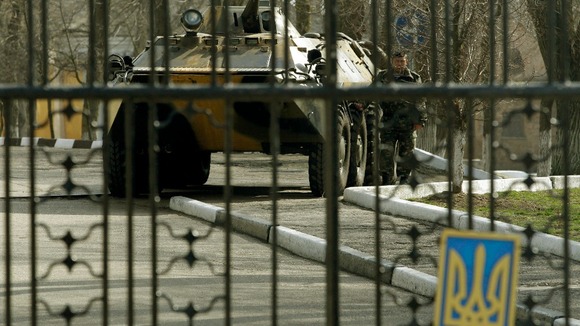
A Ukrainian armored personnel carrier is stationed behind the gate of a military base in the port of Kerch, Ukraine Credit: PA Wire
1554 GMT: Global stock markets have taken a tumble today over worries of a war in Ukraine. CNN reports:
Ian Bremmer of political risk firm Eurasia Group called the crisis “the most seismic geopolitical events since 9/11.”
…
Russia’s Micex index plummeted by nearly 13% Monday, with the ruble also taking a major hit. In a surprise move, the central bank raised key interest rates in an attempt to insulate the country against inflation and market volatility.
“The threat of war, the central government in Kiev losing control over eastern regions, fear of imminent default — these are all unnerving messages for markets,” said IHS Global Insight’s Lilit Gevorgyan. “Many investors do not have much faith that the country is going to quickly turn around from the double political and economic crisis.”
How big a drop is this for the Russian markets? Reuters reports:
On Monday afternoon, MICEX capitalisation stood at 18.4 trillion roubles ($512.03 billion), down from 20.5 trillion on Friday, the press service said in a statement.
The sum beats the $51 billion Russia spent on preparations for the Winter Olympics held in the southern city of Sochi last month.
Meanwhile, the ruble continues to fall against the euro and the dollar. BBC reports:
The rouble fell 2.5% to 36.5 roubles against the dollar and 1.5% against the euro to 50.30…
The Russian Central Bank said last month that its international reserves totalled $493.4bn as of 21 February.
The sharp falls came as Russia’s central bank hiked its key lending rate on Monday to 7% from 5.5%.
“The decision is directed at preventing risks to inflation and financial stability associated with the increased level of volatility in the financial markets,” the central bank said in a statement.
1530 GMT: More reports of Russian troops on the move:
Ural trucks that have been carrying Russian troops just spotted on the road from Simferopol to mainland Ukraine border checkpoint at Chongar
— Paul Sonne (@PaulSonne) March 3, 2014
Russian ship (R) issuing ultimatum to Ukrainian ship (L) to defect or else they will take action. #Sevastopol pic.twitter.com/I6QqwxaMT9
— Christopher Miller (@ChristopherJM) March 3, 2014
Russian Black Sea Fleet Commander: ‘If they don’t give up by 5 a.m. tomorrow, there will be a storm on UA military forces all over Crimea.’
— Christopher Miller (@ChristopherJM) March 3, 2014
Meanwhile, on the ground in Crimea, there are mixed sentiments:
Finding extremely agitated, hostile crowds, lots anti-American sentiment, support for soldiers w/ automatic weapons in #Sevastopol #Ukraine
— David M. Herszenhorn (@herszenhorn) March 3, 2014
In #Sevastopol, people voice deep fear of “fascists” in Kiev but no concern about heavily armed soldiers refusing to identify themselves
— David M. Herszenhorn (@herszenhorn) March 3, 2014
Interestingly Orthodox priest we filmed blessing Russian soldiers later told me he was against ‘occupation’ and blessed all sides for peace.
— Lindsey Hilsum (@lindseyhilsum) March 2, 2014
The priest was asking #Russian troops not to fight but to come in peace to #Crimea, not to occupy his village. pic.twitter.com/gqu69zCqKo
— Lindsey Hilsum (@lindseyhilsum) March 2, 2014
1522 GMT: Contrary to repeated reports, the page for the ultranationalist Ukrainian group Right Sector on the popular Russian social networking site VKontakte has not been removed by order of Roskomnadzor (the Russian state communications monitoring agency). As of this hour, the page was still visible with numerous posts of memes such as the one below rallying its supporters.
A post calling on Russians to form partisan units and sabotage their military infrastructure has been deleted, however. Right Sector said on Saturday that the account of an administrator had been hacked and an appeal to Chechen terrorist Doku Umarov had been placed as a provocation. The spokesman said that his group had made no such appeal to the Chechen insurgency.
A different version of this meme, by the way, was used my Alexei Navalny, the Russian opposition leader, in a post after his conviction for fraud this past summer in a trial that was widely considered political retribution.
1515 GMT: If there is an outbreak in violence, it could be at 3 AM GMT tomorrow morning, or at about 10 PM EST tonight:
Reuters: Ukrainian defence ministry source reportedly says Russian forces have given Ukrainian forces in #Crimea until 3am GMT to surrender
— Sky News Newsdesk (@SkyNewsBreak) March 3, 2014
1508 GMT: We’ve been covering the Russian media’s spin on this story — and spin may be too kind a word. They’ve invented a refugee crisis (no such crisis exists), they’ve told tales of fighters in Kiev taking over Crimean government buildings and killing ethnic Russians (pro-Russian troops have taken over the buildings, and the only people killed in clashes in the last few days were Euromaidan protesters in Kharkiv), and they have said that the European Union and the United States are driving the region to war.
Some in Russia are firing back. Famous Russian rock singer Boris Grebenshchikov, leader of the group Akvarium has complained to TV Russia 24 about what he characterized as a misuse of his song “Train on Fire” as the sound-track for a broadcast on events in Ukraine, snob.ru reports.
Grebenshchikov wrote on his Facebook page:
“Dear editors of television channel Russia 24. I am touched that you decided to use a fragment of my song ‘Train on Fire’ in your broadcast, but since you’re doing that, have the boldness not to pull a line out of the song, but use the whole song, including the words, ‘I saw the generals, they drink and eat our death.'”
“I will also remind you of the words of Antoniy Surozhsky, ‘those who hate some for the sake of others are playing into the hand of the devil.’ Are you admitting that this is exactly what you’re doing?”
Grebenshchikov didn’t specify the broadcast where his song was cherry-picked, but soon a tweet appeared from @agatacrysty (Anna Levchenko) who remarked that Russia 24 was “trolling” in a show about the Crimea.
Yesterday Grebenshchikov also appealed to the Russian government to resolve the conflict in Ukraine peacefully. “There isn’t a problem that can’t be solved peacefully; there is always a resolution that enables the prevention of people’s deaths,” he said. Other musicians who supported Ukraine and opposed the Federation Council’s decision to allow Russian troops in Ukraine were Andrei Makarevich, Yury Shevchuk and the band Zemfira.
1452 GMT: Vladimir Putin has said that Russian troops will remain in Ukraine until the situation is “normalized.” Last night Russia jets reportedly violated Ukrainian airspace. Russian troops have also reportedly taken over several key border crossings:
Ukraine’s State Border Service said Russian forces had violently taken over border posts on the peninsula and are massing armored military vehicles on its side of a narrow sea crossing separating the region from Russia, increasing pressure on Ukrainian forces still in the region.
Ukraine’s newly appointed prime minister, Arseniy Yatsensyuk, said there was little chance of resolving the standoff in the “short term.” But he said there was no evidence that Russian forces have tried to push out of Crimea into mainland Ukraine and that he doesn’t believe they plan to do so.
The Ukrainian government is preparing to fight, and its bases in Crimea, surrounded by Russian soldiers, have refused to surrender. But those troops have been given an ultimatum:
#Crimea The Russian deadline of 4 o’clock for Ukrainian troops to vacate Belbek base has passed. No sign of Russian military eviction force
— Elizabeth Palmer (@elizapalmer) March 3, 2014
Ukraine’s first president, Leonid Kravchuk, who served between 1991 and 1994, wrote in the Russian publication Snob.ru today that this crisis could spark World War III:
“I call on the Russian authorities to stop. Between our peoples should not be war. Does Russia not understand that this is the beginning of World War III?” he warned.
He vowed to defend the land of his forefathers despite his age.
“My great-grandfather and grandfather fought in World War I, along with Russia. I am 80 years old, but I’ll take a gun and I will defend their land. Every citizen will defend their territory as their home.
“We knelt and Russia sat us down. Czechoslovakia, Poland, Afghanistan, Hungary. Now Ukraine is on the line?” he continued.
If the Russian troops try to take these bases, and the soldiers inside resist, is it possible that Kravchuk’s warning could come true?
